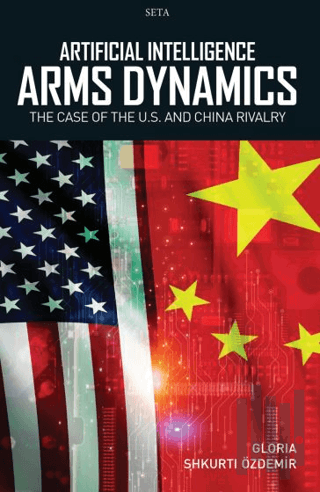
Artificial Intelligence (AI) has undergone rapid evolution, not only by penetrating every aspect of our life but also by transitioning from theoretical concepts to foundational components of modern military strategy. This book focuses into the heart of this evolution, focusing on the escalating AI arms rivalry between the U.S. and China. Drawing upon Barry Buzan’s theoretical frameworks, this book aims to analyze if there is an AI arms race between the U.S. and China as a part of the ongoing great power competition.
Findings from the study indicate that both countries perceive AI as a pivotal element of future warfare and national security, leading to significant investments in research and development. The U.S., with its historically dominant military-technological edge, seeks to maintain its superiority through innovation and strategic partnerships. Conversely, China’s ambitious AI strategy aims to establish its leadership in AI technology by 2030, challenging U.S. dominance and reshaping the global security landscape.
The analysis reveals that rather than an AI arms race where the possibility for warfare should be high, the rivalry
between U.S.-China is more an “AI arms competition” with both states not willing to start a direct war with each other, at least for the short term. Furthermore, the study finds out that the AI arms competition between both states is driven by both external threats and internal motivations, however, the technological imperative -which is considered as an independent variable- is the main driving force behind this rivalry. In conclusion, the research suggests that the AI arms competition between the U.S. and China is a defining feature of contemporary international security dynamics, with profound implications for global stability.
Artificial Intelligence (AI) has undergone rapid evolution, not only by penetrating every aspect of our life but also by transitioning from theoretical concepts to foundational components of modern military strategy. This book focuses into the heart of this evolution, focusing on the escalating AI arms rivalry between the U.S. and China. Drawing upon Barry Buzan’s theoretical frameworks, this book aims to analyze if there is an AI arms race between the U.S. and China as a part of the ongoing great power competition.
Findings from the study indicate that both countries perceive AI as a pivotal element of future warfare and national security, leading to significant investments in research and development. The U.S., with its historically dominant military-technological edge, seeks to maintain its superiority through innovation and strategic partnerships. Conversely, China’s ambitious AI strategy aims to establish its leadership in AI technology by 2030, challenging U.S. dominance and reshaping the global security landscape.
The analysis reveals that rather than an AI arms race where the possibility for warfare should be high, the rivalry
between U.S.-China is more an “AI arms competition” with both states not willing to start a direct war with each other, at least for the short term. Furthermore, the study finds out that the AI arms competition between both states is driven by both external threats and internal motivations, however, the technological imperative -which is considered as an independent variable- is the main driving force behind this rivalry. In conclusion, the research suggests that the AI arms competition between the U.S. and China is a defining feature of contemporary international security dynamics, with profound implications for global stability.
| Taksit Sayısı | Taksit tutarı | Genel Toplam |
|---|---|---|
| Tek Çekim | 292,50 | 292,50 |











